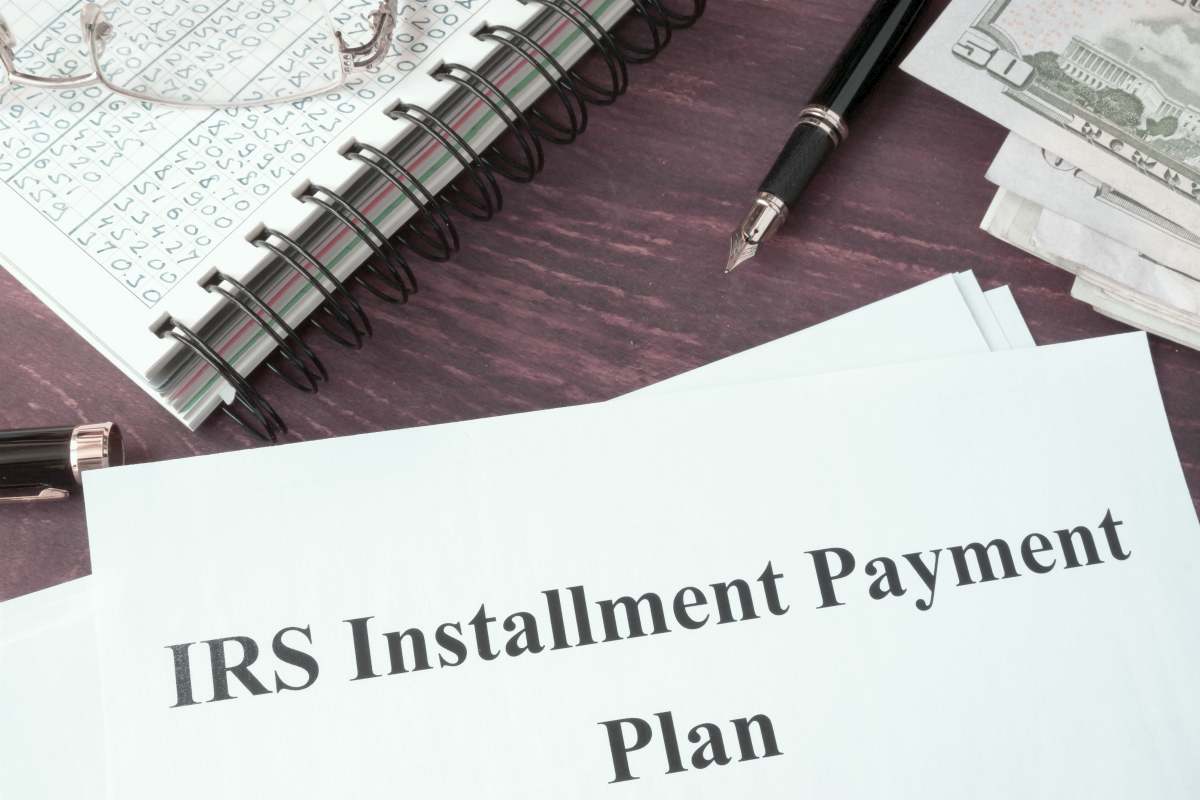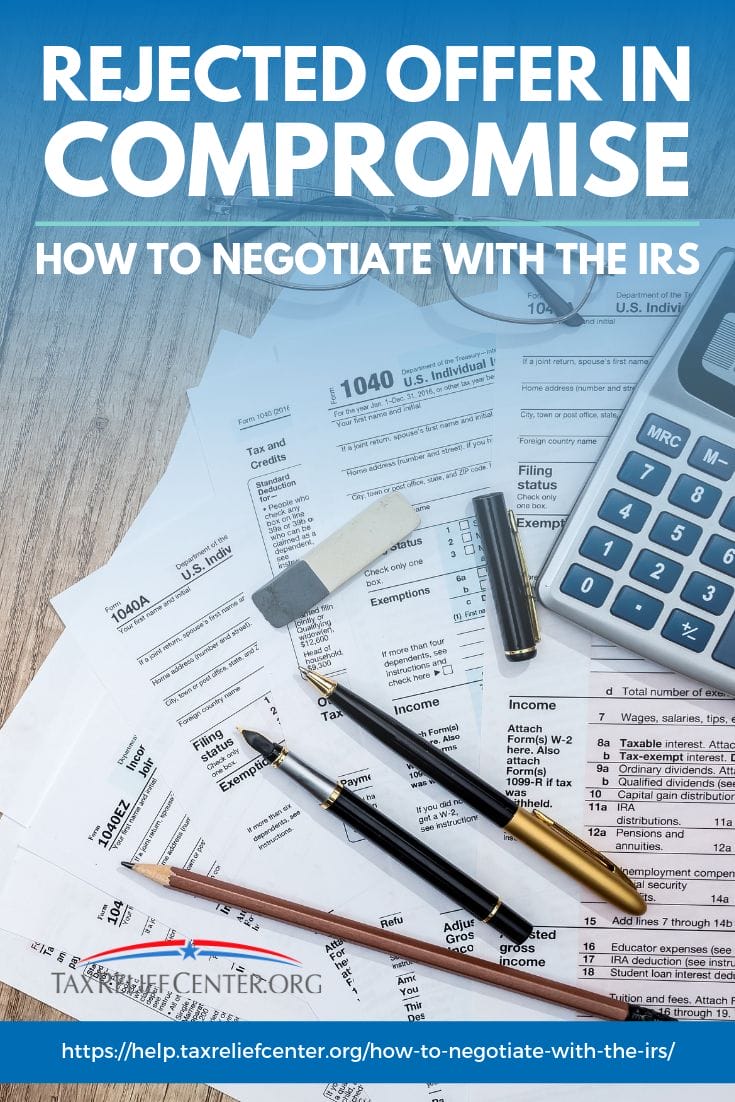Taxpayers who want to know how to negotiate with the IRS, specifically with regard to a rejected an Offer in Compromise, should educate themselves of the process.
RELATED: How To Avoid Taxes Through The Mortgage Forgiveness Debt Relief Act
In this article:
- Differentiate Between a Rejected and a Returned IRS Offer in Compromise
- Learn the Reason Why the IRS Rejected the Offer in Compromise
- Negotiate IRS Debt Properly
- Find Ways to Lower the Taxes and Penalties
- Request an Appeal with the IRS
A Primer on How to Negotiate with the IRS for a Rejected Offer in Compromise
1. Differentiate Between a Rejected and a Returned IRS Offer in Compromise
For an Offer in Compromise, taxpayers need to know as much information as they can. According to the 2017 IRS Databook, the IRS rejected 59% of all Offer in Compromise submissions by taxpayers.
Of the 62,000 OIC submitted, the IRS only granted 25,000 offers. However, the OIC submissions actually have a lower acceptance rate, since the IRS returns some OICs instead of rejecting them outright.
To apply for an Offer in Compromise, the taxpayer should use Form 656. However, the OIC booklet also contains other forms, which is what the taxpayer should use to provide information, as Form 656 is only an offer.
For the appeal, the taxpayer should use Form 13711, not resubmit Form 656 unless the IRS states to resubmit Form 656 due to formal or procedural errors.
The taxpayer should send the appeal within 30 days of the date written on the rejection notice. If the window of thirty days lapses, then the rejection of the OIC becomes final.
The difference procedurally between a returned and a rejected Offer in Compromise lies with how to proceed next.
A rejected OIC can still technically be saved through filing an IRS appeal.
On the other hand, a returned OIC can simply be resubmitted.
The IRS usually returns an offer because:
- The taxpayer applied for other remedies, like a bankruptcy proceeding
- Necessary information is lacking. Usually, the taxpayer forgot to attach forms with the information (usually Form 433-A for individuals).
- The taxpayer did not pay the application fee. As of 2017, the application fee is $186 and the IRS has not declared any additional price raise.
- New tax debts were accrued. This can happen if the taxpayer applies for the OIC near the tax deadline since the IRS needs to know the total tax debt.
- An IRS installment plan applies before the acceptance of the OIC.
- The taxpayer sent a newer OIC.
Usually, the IRS can postpone the application of most fees like the failure to file penalty. In fact, the IRS can retroactively cancel fees and penalties applied as long as they receive the returned OIC in order.
For both rejection and return for resubmission, the statute of limitations stops. That means the number of days waiting for the reply counts against the taxpayer, who cannot claim that the IRS waived the tax debt since there is no action.
2. Learn the Reason Why the IRS Rejected the Offer in Compromise

Since an Offer in Compromise can help delinquent taxpayers, knowing why the IRS rejects or returns an Offer in Compromise can increase the chances of a favorable response.
When the IRS rejects an OIC, they state why it was rejected. Here is a list of probable reasons why the IRS rejects an Offer in Compromise:
- The IRS believes that the taxpayer can fully pay the debt. The problem is not the capacity to pay but rather the method of payment, which is why the IRS prefers to have the taxpayer register for an IRS installment plan.
- A taxpayer has issues with collectibility. When the rejection states collectibility, it means the IRS thinks the offer of the taxpayer is too low in relation to their financial capacity.
- Lifestyle expenses of the taxpayer show a discrepancy between his or her expenses and incoming cash flow.
- A taxpayer submitted the Offer in Compromise only to delay proceedings by the IRS. An IRS revenue officer can spot these kinds of offers through red flags like 1) recidivism, wherein the taxpayer has a history of delinquency or nonpayment; or 2) high chances for fraud.
- If the taxpayer incurs additional tax debt while waiting for the IRS. For example, the taxpayer negotiates an OIC for the tax year 2016 but the tax year 2017 has arrived, which means that the taxpayer should pay the 2017 tax debt to show good faith while negotiating for the tax year 2016.
Once the taxpayer finds the reason why the IRS rejected the OIC, they can appeal and renegotiate the tax debt.
RELATED: IRS Debt Forgiveness Program: Are You Eligible?
3. Negotiate IRS Debt Properly
Admittedly, each tax professional has different takes on what constitutes a proper Offer in Compromise negotiation. What is effective for one offer may not be enough for another.
However, there are a few principles and techniques a taxpayer can use that may help his or her case:
- Proving good faith. A taxpayer increases his or her chances by giving a reasonable tax offer.
- Submitting complete documentation for both income and expenses. A well-structured offer can help minimize the time spent on the review by the IRS and can show that the taxpayer can be trusted.
- Applying for the OIC as soon as possible. The IRS actually declares they can start accepting offers, but taxpayers can also ask their local IRS branch office for a possible earlier negotiation.
- Prove that financial difficulties will arise if the IRS honors the original tax debt.
- Staying on top of tax responsibilities by prioritizing the IRS. Most of the time, getting a loan is cheaper in the long run compared to IRS levying fees.
- Treating the IRS revenue officer with respect.
TIP: Refer to the National Standards for food and clothing for hard numbers to make the Offer in Compromise stronger. If the taxpayer’s income is lower or equal to the National Standards, the chances of an approved OIC are high.
Do note that the IRS and other government agencies can increase or decrease the national standards. It is highly advisable to refer to them first.
4. Find Ways to Lower the Taxes and Penalties

Usually, when the taxpayer is already processing the OIC, the IRS suspends most penalties and fees.
However, there are other ways to minimize tax debt, or at least the effects of a one-time lump sum.
The first is to undergo a payment plan even before an OIC. However, the taxpayer should be clear to the IRS via sending a letter or calling the local branch that the installment plan or one-time payment shows good faith and does not bar the taxpayer from applying for the OIC.
Another option is to ask for breathing room through a CNC status request. The IRS approving the Currently Not Collectible status postpones the collection of payment and at the same time does not bar the taxpayer from requesting an Offer in Compromise.
5. Request an Appeal with the IRS
Once the taxpayer finds out the reason why the IRS rejected the offer, and made plans on how to reply properly to those rejections and improve the offer, the taxpayer can now proceed to formally appealing the rejected OIC.
Important: A taxpayer only has 30 days to appeal from the date stated on the rejection notice, not from the date the taxpayer receives the letter.
There are two main ways to appeal.
- Accomplish Form 13711 and send to the IRS via mail. If the taxpayer has a professional helping him or her, also file Form 2848 (Power of Attorney).
- Send a letter to the IRS stating you want to appeal the rejected OIC.
However, if the taxpayer plans to appeal using an informal letter, he or she must make sure the letter includes:
- The IRS rejection letter, or at least a copy;
- Which tax years the OIC refers to;
- Personal information like the legal name, current address, and phone number;
- The reasons why the taxpayer disagrees with the rejection; and
- Letters, bills, and any other document that can help convince the IRS to approve the appeal.
Lastly, make sure that the taxpayer signs the letter as well as state all the information in the letter is true under the penalties of perjury.
A rejection from the IRS does not mean the end of possible options to lower the tax debt. As long as the taxpayer knows how to negotiate with the IRS properly, then the chances of an approved OIC or appeal increases.
Do you know anyone who went through the OIC appeal process? What are your thoughts about the Offer in Compromise Program? Let us discuss in the comments section below.
If you owe back taxes, visit taxreliefcenter.org for more information on tax relief options.
Up Next:
- What Is The IRS Taxpayer Advocate Service And How Can It Help Me?
- Using The IRS First Time Abatement Strategically To Reduce Penalties
- What Are The IRS Payment Plan Options?


